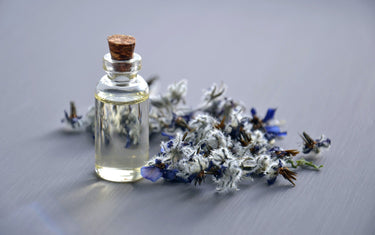5 min read / 18 August 2023 / Laura Garvin Gomez
How to Use Lavender Oil for Burns
Explore the therapeutic uses of lavender oil for treating burns with our comprehensive guide.
Share this post

Lavender essential oil is perfect for creating a relaxing atmosphere and for treating a variety of skin conditions.
But did you know you can also use lavender oil for burns? It’s a method that has been used by people around the world for centuries, with the plant’s natural properties offering potential relief for minor burns and scalds.
To understand how effective lavender oil can be for burns, we highlight some of the medical research, how to use it if you have been burnt and what other alternatives are available.
Is lavender oil good for burns?Using lavender oil for burns could be helpful, although only potentially for certain types of burns. The oil is suitable for treating minor burns that damage the outer layer of skin, which you can see if the skin is red, slightly swollen and painful, without any blisters forming. If you experience any of the burns described below you should seek medical attention, as lavender oil will not provide the relief needed for:
As we mention below, lavender oil should not be the first thing you apply to your skin if you experience a minor burn. The NHS advise that treatment solutions should only be used on your skin when the burn has cooled and is less likely to be irritated. |

What does research say about using lavender oil for burns?
Whilst many people believe that lavender oil can help to heal burns, there is currently no scientific evidence to support this anecdotal claim.
One study often cited found that regular application of lavender helps to speed up wound recovery. Whilst the study did not specifically look at using lavender oil to treat burns, applying a diluted solution to a burnt area of skin could prove useful.
Lavender essential oil does contain anti-inflammatory, antibacterial and anti-microbial properties and many people have reported that after applying it to a burnt area of skin for a certain period they have seen some improvements. It is likely that this is also the reason why the oil is often used to treat minor sunburn.

How to use lavender oil for burns
If you have experienced a minor burn, you can use lavender oil by following the steps below:
1. Take action
Before you apply any lavender oil to your skin, you should do the following:
- Remove yourself from the heat source responsible for the burn.
- Take off or remove any clothing and jewellery that is near the burn.
- Place the burnt area under lukewarm water for 20-30 minutes.
- Avoid using ice water, ice, creams or any greasy substances.
2. Cover the burn
The next thing to do is to cover the area with a layer of cling film.
3. Apply lavender oil
Once the burn begins to heal, mix 2 ml of lavender essential oil with 100 ml of carrier oil to ensure it is diluted and safe to apply to your skin.
4. Keep an eye out for skin irritation
Even when lavender oil is diluted, there is a small chance that it could irritate your skin. If this happens, or if the condition of the burn is not improving, discontinue using the oil.
It could simply be an allergic reaction to the oil, or the burn may be more serious than first thought. You should seek medical attention if it turns out to be the latter.
Are there any other essential oils you can use for burns?
There are some other types of essential oil you can use for burns, including:
- Eucalyptus oil can help to ease wound and burn symptoms: According to a 2015 review, Eucalyptus Essential Oil was used to treat burns, as well as cuts, insect bites and lice. The oil contains anti-inflammatory, astringent and antimicrobial properties, and it may also be able to prevent burns from becoming infected.
- Juniper Berry oil could treat inflammation and infection: Juniper Berry Essential Oil contains a compound called thujone, which may prove useful in preventing infections, soothing inflammation and aiding healing. The discovery of thujone in juniper oil was first discovered in a 2015 study, and its presence has been confirmed by subsequent studies.
- Peppermint essential oil contains pain-relieving properties: There is ongoing research into how the mint species, especially Peppermint Essential Oil, can prove to be a very useful pain management solution. In 2011, a study concluded that peppermint was an effective analgesic, whilst its anti-inflammatory properties could be good for treating minor burns.
- Clary Sage oils antibacterial properties could minimise burn infections: All types of sage contain antibacterial properties, which means that using Clary Sage Essential Oil to reduce the chance of infection in burns could be an option. Additionally, a 2015 review found that it also contains antimicrobial properties, which further strengthens claims about its ability to protect burns against infections.
- Thyme oil contains some pain-relieving properties: A 2011 review found that a compound contained in Thyme Essential Oil offered clear pain-relieving properties, which could be used to treat burns. The compounds are called thymols (which is also found in bergamot oil) which can also work as an anti-inflammatory agent, so it may be able to treat minor burns.

Lavender essential oil will continue to be used by people to treat burns, even though there is no solid scientific research to verify its effectiveness. If you are a first-time user, always carry out a patch test to ensure it is suitable for your skin type and ensure that it is properly diluted with a carrier oil before application. If you are unsure about using lavender oil, then there are plenty of alternatives you can try, so if you are looking for a natural treatment, essential oils may be able to help ease the pain and appearance of a minor burn.









